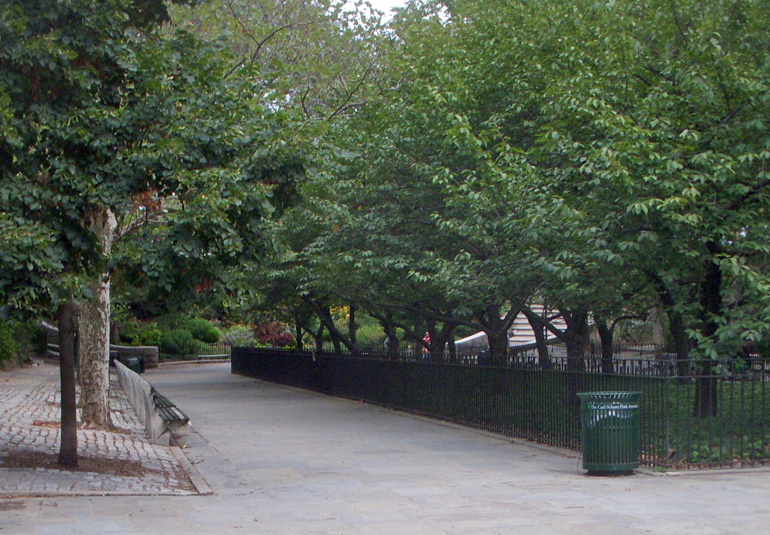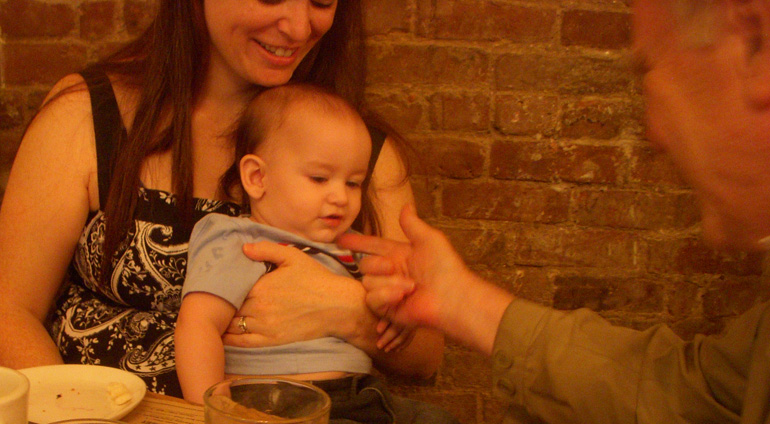Daily Office:
Wednesday, 6 October 2010
¶ At The Baseline Scenario, historian Lawrence Glicksman makes an appeal that will be familiar to regular readers. For which lack of novelty we would apologize, if it were not for the importance of regular reminders that there is a movement afoot to transfer public wealth into private pockets.
Despite their endorsement of the state’’s role as a creator of markets, provider of infrastructure, and consumer of goods and services, Americans have simultaneously held a longstanding suspicion of the state. What they most detested about the state as it existed in Europe was the way in which it granted privilege to the powerful and enabled the wealthy to further enrich themselves. They also feared the standing armies and the co-mingling of the military and the civil government that characterized Old World regimes. They feared the kind of arrangement that Cheney and his company profited from––what today we call corporate welfare and the military-industrial complex––and they did so not because they uniformly condemned federal power but because they feared a state that would entrench insiders and elites.
Cheney’’s comment is even more relevant today than it was when he uttered it a decade ago. Politicians and pundits continue to deny government’’s proper––and historic–place in economic development and equally to deny or minimize the dangers of government power as manifested by secrecy, the revolving door between business and government, and unscrutinized contracts handed out to private businesses like Haliburton.
We desperately need a narrative about the role of the government in our political and economic life to compete with the one that currently dominates the conventional wisdom. Such a narrative would hold that taxes are a means of raising funds for necessary collective endeavors, that regulation can just as easily promote as stifle freedom (such as the freedom to avoid toxic drugs and unsafe food), and that government can, as the Founders recognized, promote the general welfare. It need not celebrate all forms of government power and should call attention to the dangers of an overreaching state that we have become especially aware of over the last decade. Perhaps if such a narrative had been in place in 2000, Americans would be facing our current crisis with a more balanced sense of the strengths and limitations of government, and a more accurate sense of how our predecessors understood them.
¶ This story doesn’t really have everything; it just feels like it: “Henning Mankell: The special relationship.” Or, “Bergman in Gaza.” (Independent; via  Arts Journal)
The main subject of my interview isn’t Larsson or Björn Borg. Nor is it the psychology and unlikely appeal of the morose Detective Kurt Wallander. It is Mankell’s ongoing attempts to make an ambitious TV drama and feature film about his father-in-law, Ingmar Bergman – a project interrupted in surreal fashion by the Israeli army.
Earlier this summer, Mankell was aboard the Gaza-bound aid flotilla that was attacked by Israeli forces. To his consternation, part of the screenplay for his new film about Bergman was confiscated by the Israeli soldiers.
“Whatever I do, I am always working on something,” says Mankell, explaining how he happened to have the Bergman screenplay in his possession at the same time as he was taking part in a mission to bring aid supplies to Gaza in defiance of the Israeli blockade. “When everything was stolen and confiscated, they [the Israeli troops] also took the manuscript,” he recalls. “What the hell are they supposed to do with that?”
Four months later, the Israelis still haven’t returned Mankell’s screenplay. He jokes that the Israelis must have thought the screenplay – called Crisis in deference to Bergman’s directorial debut – was written in code. Mankell very much doubts that the young commando soldiers who took the screenplay even knew who Bergman was.
¶ Megan McCardle is not exactly dazzled by Steven Johnson’s new book, Where Good Ideas Come From. Innovation, as she suggests, often occurs at a pace that can’t be kneaded into a satisfying narrative. (WSJ; via Marginal Revolution.)
Reverence for the great-discovery model of innovation is what prompts critics of the pharmaceutical industry to declare that all the “real work” of drug discovery is done in university labs, often with taxpayer funding. Drug companies, we are often told, simply steal the ideas and monetize them. And yet what “Big Pharma” does no less crucial to drug discovery than the basic research that takes place in academia. It is not enough to learn that a certain disease process can be thwarted by a given molecule. You also have to figure out how to cheaply mass-produce that chemical, in a form that can be easily taken by ordinary patients (no IV drugs for acid reflux, please). And before the drug can be approved, it must be run through the expensive human trials required by the Food and Drug Administration.
The endless creativity of the human animal is one of the differences between us and a chimpanzee poking sticks into an anthill in search of a juicy meal. But another one is our capacity for the endless elaboration and refinement of ideas—particularly in a modern economy. Toyota’s prowess at this sort of incremental improvement is legendary, even radical. Wal-Mart, it is said, was responsible for 25% of U.S. productivity growth in the 1990s. That’s not because Sam Walton emerged from his lab one night waving blueprints for a magic productivity machine. The company made continual, often tiny, improvements in the management of its supply chain, opening thousands of stores along the way and putting the benefits within reach of virtually every American.
We are all of us, every day, discovering many things that don’t work very well and a few things that do. Reducing the history of innovation to a few “big ideas” misses the full power of human ingenuity.
¶ Since James Surowiecki wrote it, you probably won’t want to procrastinate about reading his piece on procrastination, “Later,” in The New Yorker. And, once you begin, you’ll soon be at the end, where there’s an intriguing debate about “the extended will,” which is common sense to Aristotelian humanists but cheating to Kantians. (And you don’t want that on your Kantians!)
The idea of the divided self, though discomfiting to some, can be liberating in practical terms, because it encourages you to stop thinking about procrastination as something you can beat by just trying harder. Instead, we should rely on what Joseph Heath and Joel Anderson, in their essay in “The Thief of Time,†call “the extended willâ€â€”external tools and techniques to help the parts of our selves that want to work. A classic illustration of the extended will at work is Ulysses’ decision to have his men bind him to the mast of his ship. Ulysses knows that when he hears the Sirens he will be too weak to resist steering the ship onto the rocks in pursuit of them, so he has his men bind him, thereby forcing him to adhere to his long-term aims. Similarly, Thomas Schelling once said that he would be willing to pay extra in advance for a hotel room without a television in it. Today, problem gamblers write contracts with casinos banning them from the premises. And people who are trying to lose weight or finish a project will sometimes make bets with their friends so that if they don’t deliver on their promise it’ll cost them money. In 2008, a Ph.D. candidate at Chapel Hill wrote software that enables people to shut off their access to the Internet for up to eight hours; the program, called Freedom, now has an estimated seventy-five thousand users.
Not everyone in “The Thief of Time†approves of the reliance on the extended will. Mark D. White advances an idealist argument rooted in Kantian ethics: recognizing procrastination as a failure of will, we should seek to strengthen the will rather than relying on external controls that will allow it to atrophy further. This isn’t a completely fruitless task: much recent research suggests that will power is, in some ways, like a muscle and can be made stronger. The same research, though, also suggests that most of us have a limited amount of will power and that it’s easily exhausted. In one famous study, people who had been asked to restrain themselves from readily available temptation—in this case, a pile of chocolate-chip cookies that they weren’t allowed to touch—had a harder time persisting in a difficult task than people who were allowed to eat the cookies.
Given this tendency, it makes sense that we often rely intuitively on external rules to help ourselves out. A few years ago, Dan Ariely, a psychologist at M.I.T., did a fascinating experiment examining one of the most basic external tools for dealing with procrastination: deadlines. Students in a class were assigned three papers for the semester, and they were given a choice: they could set separate deadlines for when they had to hand in each of the papers or they could hand them all in together at the end of the semester. There was no benefit to handing the papers in early, since they were all going to be graded at semester’s end, and there was a potential cost to setting the deadlines, since if you missed a deadline your grade would be docked. So the rational thing to do was to hand in all the papers at the end of the semester; that way you’d be free to write the papers sooner but not at risk of a penalty if you didn’t get around to it. Yet most of the students chose to set separate deadlines for each paper, precisely because they knew that they were otherwise unlikely to get around to working on the papers early, which meant they ran the risk of not finishing all three by the end of the semester. This is the essence of the extended will: instead of trusting themselves, the students relied on an outside tool to make themselves do what they actually wanted to do.
¶ Philip Greenspun reviews The Social Network in personal terms not available to film critics: “ It was our generation’s job to show his generation how to do stuff, so we did our job and he did his.” (If only he’d commnented on the Winklevoss claims!)
Former students often ask me what I think of Facebook. Many of them are just a little older than Zuckerberg and they say “Philip: you built all of those features in the 1990s. You taught a whole course on how to build online communities. How does it feel to see this guy make billions of dollars without having to do anything innovative?†My response is that I didn’t envision every element of Facebook. I imagined only three levels of publication: private (email), public (Web site), and community (on a Web site accessible only to other registered users of a site such as photo.net). I never had the idea of limiting information based on a network (though on photo.net we did have a “friends†feature starting in 2000 where contributions to the overall community by particular users marked as interesting would be highlighted to the person who’d selected those “friends†and that information would be displayed in reverse chronological order).
Zuckerberg seems to have done everything that the early Internet nerds suggested doing, e.g., starting with a relational database management system, watching user behavior carefully and refining the site’s feature set, providing mechanisms for users to connect and discuss. It was our generation’s job to show his generation how to do stuff, so we did our job and he did his.
My favorite part of the movie experience was a character who says that his girlfriend is “jealous, crazy, and frighteningâ€. I nudged my companion and said “Wow, she’s just like you!†Seconds later the girlfriend says “How come your Facebook page says that you’re single?†My companion had in fact uttered these very words back in 2007 and in much the same tone of suspicion and indignation. I explained that I had set it up back several years ago after being invited by some students and didn’t use Facebook except to acknowledge friend requests. If it made her unhappy I would change the status to “married†and did so. This led to a flurry of congratulatory emails from surprised friends. To each one I had to respond that I had only changed the relationship status in order to quell criticism and there had not been any wedding. That’s when I realized that Facebook was more than simply a diversion for college undergraduates.
¶ On the differences between Malaysia and Indonesia, fragments of a common territory divided by different colonial experiences. Luke Hunt’s “Love Thy Neighbour?“, in The Diplomat. (via Real Clear World)
Indonesia, divided into 17,000 islands, pressed for unity and independence from their Dutch masters through the 1945-50 conflict, while Malaysia was forged out of British colonial rule in 1957 through diplomacy that united the Malay Peninsula with Singapore, and Sarawak and Sabah in Borneo six years later.
Singapore left the federation in 1965 while the rest of Malaysia—backed by the UK, Australia and New Zealand—was fighting the 1962-66 Konfrontasi against Indonesia for control of the two Borneo states (a fight it won).
‘Indonesians claim they won independence the hard way, through revolution, while they see us Malaysians of having been handed our independence,’ Abdullah says.
The economic realities of the two may cloud relations further. Indonesia’s economy is by far the largest in South-east Asia, with an annual GDP nearing one trillion US dollars.Yet according to the World Bank, Indonesia is ranked 106th in per capita income, with an average income of about $4000 a year. Malaysia, by contrast, is ranked 49th, with an average income of $14,000.
¶ Sort like discovering the truth about Santa Claus: at The Millions, Frank Kovarik reminisces about being forced to conclude that Franklin W Dixon, purported author of the Hardy Boys mysteries, could not possibly be one man.
These authors’ names relate to an important benchmark in any Hardy or Drew fan’s reading life. It took me four years or so before I finally admitted to myself that neither Mr. Dixon nor Ms. Keene were real people, that in fact the eighty or so adventures of Bayport’s finest (eighty death-defying adventures crammed impossibly into Frank and Joe’s high school years) were not all written by the same person. The single-author theory seemed entirely plausible at first, when my experience with the Boys encompassed only a few books which, though somewhat dated, still contained copyright dates in the 1960s. Mr. Dixon, then, was an aging but still prolific man, who perhaps got up early every morning at his home on the east coast (yes, that seemed right—he should be able to look out at the ocean while orchestrating Frank and Joe’s escape from an elaborate death trap in Egypt, a locked magician’s box in Scotland, a tiger in India) to write five chapters or so. My faith began to crumble, however, as I checked out older editions of the books from my grade school resource room, editions with yellowing paper, which lacked the familiar blue spines and were bound instead in beige covers with brown lettering and, on the front cover, an iconic silhouette of two Hardy Boy-ish figures crouching with flashlights, a sad substitute for the exciting, customized illustrations that graced the newer editions. These editions contained even more outdated language than the blue-spines, using passé terms for African Americans that seemed to place the stories in the 1930s. Indeed, a glance at the copyright page confirmed this estimation.
The single-F. W. Dixon theory was seeming less likely. Even if he had begun writing the mysteries at the age of 20, the secretive (there was never an “about the author†at the end of the books) Dixon would still be in his seventies, much too old to be writing at the rate at which the Hardy novels were churned out. Finally, I came to the uneasy conclusion that there may have once been a real Dixon in the ’20s or ’30s, but he had since passed away, and his series had been edited, updated, and continued by a panel of ghostwriters at Simon & Schuster (I threw out theories which included a single ghostwriter or a Franklin Jr. carrying on his father’s tradition) who used the pseudonym for any number of reasons: to preserve the continuity of the series for youngsters who would be wary of a Hardy Boys tale told by Brian Reynolds or Suresh Desai, or to ensure that all Hardy Boys books would be shelved together in both library and bookstore, rather than scattered about by zealous alphabetizers.
We gulped a bit when we read that Frank found the older mysteries — old in our day, but still arresting when we were still depending on “training wheels” — lackluster.
¶ Now that RentAFriend is operating in the UK, BBC News asks Claire Prentice to try out the service in our own fair burgh. Â
Waiting in a cafe in Greenwich Village, New York, I wonder how I’ll recognise my friend Jenny. She’s running late and I’m starting to feel nervous. The truth is I’ve never met her before. All I know about Jenny Tam is that she just turned 30 and she rents herself out as a “friend” in her free time.
“Hi, I’m Jenny, it’s good to meet you,” says a woman smiling and extending her hand. After the waitress comes over and takes our order, we start chatting.
“I moved to New York from Los Angeles a year ago and I thought this would be a good way to make friends,” says Jenny.
Over lunch we chat about where we’re from, our families and our interests, just as you would on a first date. It feels like a strangely formal way to get to know a complete stranger, but in New York people are forever striking up conversations with people they’ve just met.
¶ Paul Greenwood’s Teddy Bear collection, on the block. (Dealbreaker)








